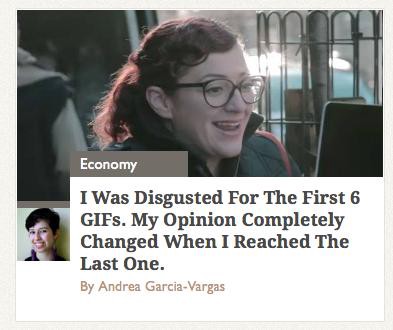Um, Is Your Facebook About To Get Less Dumb? Wow.
Um, Is Your Facebook About To Get Less Dumb? Wow.

Haha, no. But a lot of people are wondering about this, because Facebook just made an announcement:
A small set of publishers who are frequently posting links with click-bait headlines that many people don’t spend time reading after they click through may see their distribution decrease in the next few months. We’re making these changes to ensure that click-bait content does not drown out the things that people really want to see on Facebook.
Great. Who doesn’t hate clickbait? Actually, here’s a better question: Who even knows what clickbait is? Here’s Facebook’s working definition:
Click-baiting’ is when a publisher posts a link with a headline that encourages people to click to see more, without telling them much information about what they will see.
Facebook says it will penalize publishers who do this by measuring the durations of their site visits. Sites that attract and keep Facebook users will be favored over sites that attract them and quickly send them back.
The instant media response here has been glee and relief — Facebook is stopping the march of Viral Media! — just as it was last time Facebook talked about “quality” content:
Which sites is Facebook targeting with this? Upworthy? Elite Daily? Distractify? All of the above? http://t.co/CXLKEgxQjI
— Kevin Roose (@kevinroose) August 25, 2014
RIP curiosity gap
— Sam Faulkner Biddle (@samfbiddle) August 25, 2014
This, also like last time, misreads (reasonably) what Facebook means by “quality.”
About a year ago, Facebook’s engagement with the concept of “quality” was cryptic:
This means that high quality articles you or others read may show up a bit more prominently in your News Feed, and meme photos may show up a bit less prominently.
This turned out to mean spam, basically — sites that, for example, repost Facebook image memes under a new headline and surrounded by ads, or sites that promise some sort of interesting post and then take you on a circuitous spammy detour that never quite gets you anywhere. It was an engineer’s definition of quality: It didn’t mean that everyone’s feeds would be crammed with longform features and hard news; nor did it spell the end of Viral Nova, or BoredPanda, or any number of other wildly popular sites with blaring headlines and questionably aggregated image lists. People love these sites! They click on them, they share them, they get lost in them, they spend a lot of time on them. It doesn’t matter if reporters, whose stories are competing for the same limited Newsfeed space, think they’re garbage. (Also, know that for every high-profile new viral site there are probably five spammier knockoffs with names you’ll never remember, and content created as much for chumbox advertising arbitrage as for actual humans. People do not love these sites, and I’m guessing Facebook doesn’t either.)
Facebook’s wording here will also foster misunderstanding, because everybody has their own definition of “clickbait.” For media consumers, it’s usually something along the lines of “things that I don’t think are important, or that I disagree with.” For media producers, it’s usually something closer to “things that are not like the things I do.” (Also: Nobody wants to be the idiot fish in this weird metaphor! This is one problem with adopting a pejorative expression as a term of art.)
Upworthy has attracted as much ire as any viral site — plenty of reasonable people would call it “clickbait” — with its curiosity-gap headlines and its open exploitation of Facebook users’ irrepressible urge to show their friends that they definitely care about IMPORTANT THINGS. But Facebook’s announcement today is great news for Upworthy. The site has been pushing “attention minutes” as the next internet metric all year:
We love thinking this way because it rewards us for sharing content that people really enjoy and find valuable — not just stuff they click on a lot. It may mean that we don’t do quite as well on uniques or pageviews, but that’s a trade-off we’re happy to make because this is a metric focused on real audience satisfaction.
Upworthy isn’t the only company interested in this idea, nor is it the only type of company: Analytics company Chartbeat has been leading the charge on the time metric as a more honest alternative to page views and unique visitors, and Medium has used it to determine how much to pay certain contributors.
It doesn’t take much imagination to think of ways to game “attention minutes” — if you’ve ever seen a headline over a YouTube embed with an appeal to stick around until a certain point in a video, or a post that implores you to stick around for a particular list item (These 29 Advertisements Are Almost Too Clever For Their Own Good. #11 Got Me Good. LOL.), then you’ve already seen some of these strategies in action. You know what else takes a long time? Quizzes. Games. The possibilities are terrifying and endless! But time-spent, as a narrow definition of the value of a post on the internet, suits Facebook’s needs pretty well; its definition is more circular than subjective. The company wants people to see more things that they like, that they engage with, that they spend time with, and that they pass along to friends, so that they spend more time on Facebook. Many of those things look a lot like this:

“Some guy you friended eight years ago” is the new internet patois.
Image from the Found Animals Foundation.
